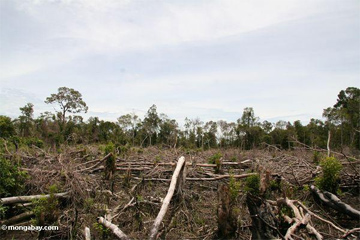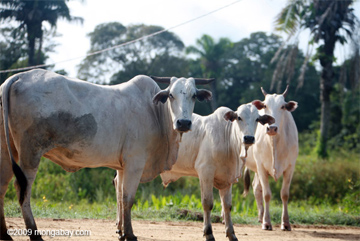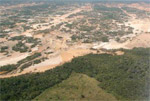McDonald’s (NYSE:MCD) announced a far-reaching sourcing policy that could significantly reduce the fast-food giant’s impact on the environment, including global forests.
Yesterday McDonald’s unveiled its Sustainable Land Management Commitment (SLMC), a policy that requires its suppliers to use “agricultural raw materials for the company’s food and packaging that originate from sustainably-managed land”. The commitment will be monitored via an independent evaluation process, according to the company.
The policy will initially focus on five commodities: beef, poultry, coffee, palm oil, and packaging. McDonald’s target commodities are based on analysis conducted in partnership with environmental group WWF’s Market Transformation initiative led by Jason Clay.
McDonald’s has announced several environmental criteria for sourcing in recent years including seafood and soy commitments, but the new pledge brings in more commodities.
 Palm oil is a highly productive crop grown primarily in Indonesia and Malaysia. Palm oil is used widely in processed foods, cosmetics, and soaps. It is also increasingly used as a biofuel.  While palm oil can be produced sustainably, much of recent expansion has come at a high environmental cost. By some estimates, more than half of oil palm expansion since 1990 occurred at the expense of forests, spurring strong backlash from environmentalists concerned about greenhouse gas emissions and loss of habitat for endangered wildlife—including orangutans, pygmy elephants, Sumatran rhinos and tigers. Oil palm plantation development has also exacerbated social conflict in some areas. The RSPO is an effort to improve the social and environmental performance of the industry. |
Under SLMC, McDonald’s is working with the Global Roundtable for Sustainable Beef to improve the environmental performance of beef production and is sponsoring a three-year study to assess carbon emissions on 350 ranches in the U.K. and Ireland. The company said it plans to join the Roundtable on Sustainable Palm Oil (RSPO) this year and will source only RSPO-certified palm oil by 2015. McDonald’s has also joined the Sustainability Consortium, a group working to build tools to assess the environmental impacts of consumer products over their life-cycle.
McDonald’s said it is introducing the policy as a response to consumer concerns.
“We know that our customers care about where their food comes from,” said Francesca DeBiase, McDonald’s vice president for Strategic Sourcing, in a statement.
The announcement comes amid a broader emphasis on sustainability by consumer-facing retailers worldwide. As corporations have increased the share of resources they consume in meeting global demand for their products, they have found themselves increasingly under pressure to become better stewards of the environment. Accordingly, a number of major retailers in recent years have announced new sourcing policies that improve traceability of raw materials in their supply chains. Suppliers have either had to meet these criteria or find new customers.
McDonald’s experienced this first-hand in 2006 when the activist group Greenpeace launched a campaign targeting animal feed used to fatten chickens used for McNuggets in Europe. Greenpeace spent a year tracking soy as it moved through the supply chain from farms in the southern Amazon to ports on the Amazon River, across the Atlantic, and eventually to poultry facilities in Britain and Ireland.
font size=2 face=sans-serif> More than 70 percent of land deforested in the Brazilian Amazon ends up as pasture, making cattle production one of the most important drivers of deforestation in the world. In 2009 major beef processors, traders, and buyers in Brazil announced a moratorium on deforestation for cattle production. Photo by Rhett A. Butler. |
The response was immediate. McDonalds—stung by the McLibel case of the 1990s and other activist campaigns—immediately demanded its suppliers provide deforestation-free soy, presenting the industry was presented with a daunting dilemma: move towards environmental respectability or of its biggest, and most influential, customers. The largest soy players—whose vast portfolio of commodities are sold globally—chose the former, agreeing to a moratorium on soy grown on newly deforested lands that has changed the way commodities are produced in the Amazon. The moratorium has been extended every year since and through monitoring, which has has continually improved, has shown to be effective at reducing direct forest clearing for soy production.
In a sign of the campaign’s success, John Sauven, a Greenpeace campaign director at the time—issued a statement congratulating McDonald’s for using “its might to push a multi-million dollar industry towards a more sustainable future.”
“I cannot say it came naturally to Greenpeace to jump into bed with the world’s largest fast food company!” Sauven said in the statement.
McDonald’s, which says it has 32,000 locations that serve approximately 64 million customers in 117 countries each day, acknowledged its global environmental responsibility in making its latest announcement.
“McDonald’s serves customers around the world, and we accept the responsibility that comes with our global presence,” said McDonald’s Chief Executive Officer Jim Skinner. “We will continue to focus our energy on developing sustainable sourcing practices and broadening our menu choices.”
Related articles
Corporations, conservation, and the green movement

(10/21/2010) The image of rainforests being torn down by giant bulldozers, felled by chainsaw-wielding loggers, and torched by large-scale developers has never been more poignant. Corporations have today replaced small-scale farmers as the prime drivers of deforestation, a shift that has critical implications for conservation. Until recently deforestation has been driven mostly by poverty—poor people in developing countries clearing forests or depleting other natural resources as they struggle to feed their families. Government policies in the ’60s, ’70s, and ’80s had a multiplier effect, subsidizing agricultural expansion through low-interest loans, infrastructure projects, and ambitious colonization schemes, especially in the Amazon and Indonesia. But over the past two decades, this has changed in many countries due to rural depopulation, a decline in state-sponsored development projects, the rise of globalized financial markets, and a worldwide commodity boom. Deforestation, overfishing, and other forms of environmental degradation are now primarily the result of corporations feeding demand from international consumers. While industrial actors exploit resources more efficiently and cause widespread environmental damage, they also are more sensitive to pressure from consumers and environmental groups. Thus in recent years, it has become easier—and more ethical—for green groups to go after corporations than after poor farmers.
How Greenpeace changes big business

(07/22/2010) Tropical deforestation claimed roughly 13 million hectares of forest per year during the first half of this decade, about the same rate of loss as the 1990s. But while the overall numbers have remained relatively constant, they mask a transition of great significance: a shift from poverty-driven to industry-driven deforestation and geographic consolidation of where deforestation occurs. These changes have important implications for efforts to protect the world’s remaining tropical forests in that environmental groups now have identifiable targets that may be more responsive to pressure on environmental concerns than tens of millions of impoverished rural farmers. In other words, activists have more leverage than ever to impact corporate behavior as it relates to deforestation. A prime example of this power is evident in a string of successful Greenpeace campaigns, which have targeted some of the largest drivers of deforestation, including the palm oil industry in Indonesia and Malaysia and the soy and cattle industries in the Brazilian Amazon. The campaigns have shared a common approach: target large, conspicuous consumer-facing companies that sell in western markets.
Shift from poverty-driven to industry-driven deforestation may help conservation
(08/06/2008) A shift from poverty-driven deforestation to industry-driven deforestation in the tropics may offer new opportunities for forest conservation, argues a new paper published in the journal Trends in Evolution & Ecology.